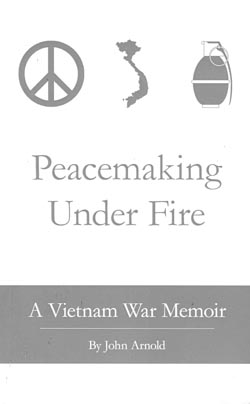 |
Peacemaking Under Fire - Another LookBy Gerald R. Gioglio (reviewer)Peacemaking Under Fire: A Vietnam War Memoir
In Peacemaking Under Fire author John Arnold proves to be a delightfully unpredictable peace activist — and I might add a patriot of a similar style. Here's a guy at age 17 who believed, like so many of us, in an America of good guys wearing white hats, but began smelling something rotten wafting out of Southeast Asia. Hey, what's a boy to do? For Arnold, it was grab that white hat and enlist in the Marines. Then, head to Vietnam as a Communications Specialist and do whatever it took to promote peace, justice and the American way — be it at the point of his pen or the barrel of his Tommy Gun. Really. As they say, "it's a long story," and one to savor. Peacemaking Under Fire is an accessible, appealing narrative that traces one man's remarkable journey and witness for peace. The "Peacemaking" part begins with justifiable adolescent rage over the war leading to civilian peace activism. The "Under Fire" part begins in high school, depicts boot camp life, documents Vietnam experiences and ends back home with Arnold navigating PTSD. In boot camp and in Vietnam, he orchestrates continuous and ongoing anti-war letter-writing campaigns and gets intensely involved with the GI Press. In some of the best vignettes, he brings us along on Med Cap missions. Here he helps care for and, when needed, helps protect the civilians in the villages of Vietnam by shouldering that Tommy Gun. Really. As a trusted "#1 GI," he receives valuable logistical warnings from civilians that once saved his life and many times saved the lives of his buddies. Coming home he connects with VVAW and GI-civilian peace action, finding redemption in the arms of the woman who would help him navigate PTSD. Arnold presents his experience in a light, folksy style, with humor, irony and a keen eye for the absurd. Anyone who has done eighteen-hours of Kitchen Police (KP) duty will appreciate the vignette entitled "The Messman From Hell." Here, Arnold and a gang of "E-Zip-Zero Private Maggot" nobody's go above and beyond a Mess Sergeant's directive to clean up, with some amazing, jaw-dropping results. Then, if you've ever been under surveillance by Military Intelligence (and, if you're reading this paper you know you were), you'll appreciate the "Marine Attack" Arnold and his mates launched on a couple Naval Intelligence types, who shall we say, were a bit too obvious when going undercover. But this is only the comic relief. Arnold can travel on the dark side and when he does, he fires for effect. Indeed, the brutality of basic training and the horror of war are up front and center on many of these pages. His description of punishments handed out during boot camp that led to hospitalizations, mental health problems and a reported suicide is the kind of stuff that few civilians believe when it is depicted in a novel or a Hollywood movie. The work could use an index and would have benefited from a bit of fact checking. For example, the founder of the American Servicemen's Union, Andy Stapp, appears here as Andy Sapp. A reader might also hope for more reference notes to be able to research the GI resistance and certainly some of the more shocking assertions reported in these pages. But hey, this is a memoir after all — it's not masquerading as a scholarly tome. These days, VVAW Contacts frequently get requests from high school and college students seeking interviews and for information about the war and GI resistance. Some of us who respond to these requests ponder the best approach to help these students. Do we agree to the interview or send them packing to the library to do the research? I submit that Peacemaking Under Fire provides us with a third way. Like, "Dear X, we got your request for an interview. Go read John Arnold's book, get shocked, awed and inspired to learn more, and then yeah, call us." The bottom line is this. The book is worthy of your shelf. Hopefully, it will soon be an eBook. With luck, some publisher will latch on to it, address some of the loose ends and give it a greater distribution. Meanwhile, let me recommend it to vets, GIs, anybody thinking about enlisting and/or those currently being harassed by recruiters, and anybody else wanting a fresh take on military training or the national nightmare known as the Vietnam War. Gerald R. Gioglio, OFS is a VVAW member. He is the author of Days of Decision: an Oral History of Conscientious Objectors in the Military during the Vietnam War and editor of I Refuse: Memories of a Vietnam War Objector. He was discharged from the US Army in 1969 as a Catholic Conscientious Objector and is a member of the Secular Franciscan Order.
|


